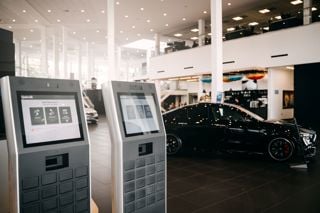Employee car ownership schemes (ECOS) widely used by OEMs and car dealerships are set to start incurring company car tax from autumn 2026 under new laws drafted by HM Revenue & Customs.
The HMRC rules follow a pledge by Chancellor Rachel Reeves in the last autumn budget, and the Treasury estimates that it will be worth an additional £275 million in tax take in its first year (2026/27), £220m in 2027/28, £195m in 2028/29 and £175m in 2029/30.
The use of ECOS has declined over the years but they are still widely used by car manufacturers and dealers for their own employees, who can obtain a new car at a substantially discounted price. The cars are then typically bought back by the manufacturer or dealer to secure good quality used car stock.
And for some businesses, providing high-value cars without triggering a car benefit charge has been a big part of their employee reward strategy.
HMRC estimates that the tax change will impact 76,000 employees at 1,900 companies, who currently receive cars through an ECO scheme.
Implementation of the new rules will now be delayed for six months until October 6, 2026. This is to allow employers to familiarise themselves with the changes, make preparations and discussions with relevant employees, resolve the treatment of any specific cases such as retired employees and then record vehicles provided through an employee car ownership scheme as company cars through payroll or move employees from the ECOS to a company car scheme.
 Ian McMahon (pictured), Cooper Parry’s head of automotive, said: "When the Government announced in the Autumn Budget that it wanted to stop “contrived” employee car ownership schemes, it sounded like a focused, targeted move. But now that the draft legislation is out, it’s clear the impact will be much wider. In short: this isn’t just about shutting down a few clever schemes. This could signal the end for all ECOS arrangements."
Ian McMahon (pictured), Cooper Parry’s head of automotive, said: "When the Government announced in the Autumn Budget that it wanted to stop “contrived” employee car ownership schemes, it sounded like a focused, targeted move. But now that the draft legislation is out, it’s clear the impact will be much wider. In short: this isn’t just about shutting down a few clever schemes. This could signal the end for all ECOS arrangements."
He said HMRC's explanatory notes make it evident that it is the motor industry which is under HMRC's spotlight, as it highlights cars that are returned after a specified mileage or period to feed the nearly new car market, and cars that remain part of the employer's stock and are available for test drives.
“Our overarching guidance for dealers and similar businesses is to assess the commercial impact as soon as possible. Where new starter offers are being made, ensure any communications do not rely on the provision of an ECOS car (or similar) as part of the T’s & C’s. Start to wind down the exposure to the ECOS ‘fleet’ in a controlled manner. Consider the merits of a salary sacrifice vehicle program to limit the impact of the legislation."
Now is the time to understand how the legislation will affect the current setup, assess the cost and operational impact, and explore alternative options that make sense for the business.
Paul Taylor, managing director of Car Benefit Solutions, said that the proposed legislation makes the motor car the only product in the UK that a manufacturer or retailer can’t sell to their employee at or above cost, and at some point in the future agree to repurchase for a fair market value, without a taxable benefit arising.
CBS highlighted that the legislation doesn’t stop the sale of a new vehicle to an employee or prevent them from being provided with an associated loan. This means that there is clarity and clear direction towards the future design of car schemes.
What is an Employee Car Ownership Scheme?
Unlike a company car scheme, in an ECOS the employee purchases the car under a credit sale agreement and meets the monthly finance and running costs using a mixture of the income tax savings from no longer having a company car and the maximum tax-free mileage reimbursement for business journeys under the Government’s Approved Mileage Allowance Payments (AMAPs) scheme.
Because the employee, not the employer, owns the car, they have been able to avoid company car tax no matter how much support or discount the employer provides.























Login to comment
Comments
No comments have been made yet.